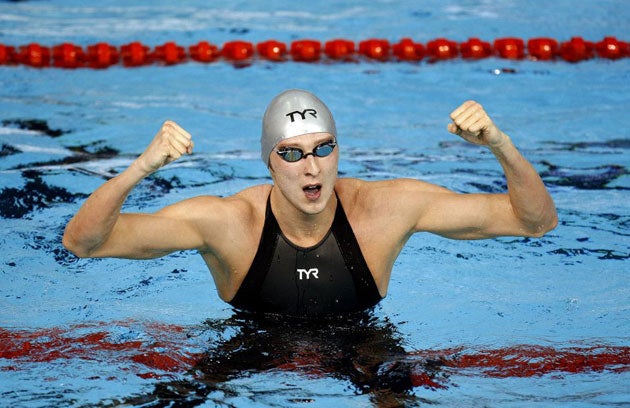Next generation of swimwear sparks revolt
Britain's head coach joins outcry after new racer suit leads to records tumbling

The head coach of British Swimming, Dennis Pursley, has given his backing to the revolt by leading European coaches over swimsuits after the number of world records set this year reached 105 at the European Short-Course Championships in Croatia.
Fifteen out of the 17 top European nations, including Great Britain, have signed a protest which is to be presented to the world governing body FINA calling for a number of regulations to be discussed and implemented. Their concerns centre on the technological advances in the design of swimsuits and the fabrics used, with records starting to fall immediately after the introduction of the Speedo LZR Racer suit in February.
Within six weeks more than 15 world records had fallen and in Rijeka nine marks went, including four to Amaury Leveaux alone. The Frenchman became the first man to break the 45-second barrier in the 100metres freestyle and his time of 44.94 means almost two seconds has been taken off Alex Popov's record in just 13 months.
The materials used in the suits include polyurethane panels which help the swimmers become more streamlined through the water and neoprene, a flotation device. As a result the swimmer is allowed more speed and buoyancy in the water and fatigue is delayed.
Pursley said: "It demeans the records and kind of cheapens them to an extent. Up to this generation of suits I think it's just been maximising performance but I think we're crossing the line to enhancing performance and to me that is a whole different area." FINA are set to meet with coaches and suitmakers in the next two months and Pursley wants action to be taken. He added: "There is a strong consensus in the coaching community that feel that at the very minimum there needs to be regulation and there needs to be monitoring and there needs to be a strict approval process. And whatever is approved needs to be available to all the teams and all the athletes at least a minimum of 12 months in advance of the competition."
FINA regulations state no device should aid buoyancy, speed and endurance but when questioned further at the World Short-Course Championships in Manchester in April, the governing body insisted the swimmers were not using a device, but simply wearing a suit. Now Pursley wants FINA to take a strong lead as he fears the next step is for suits to be designed for individuals. He added: "It's opening the door to go in a whole different direction that can possibly advantage some athletes and some teams to go above and beyond others and that's not to mention all the ramifications below the top level."
Suits you, sir: The science of speed
*NASA helped with the design of the suit.
*Tests were performed to show where the biggest drag occurred on a swimmer's body in order that the suit might reduce this drag.
*Body scans of 400 elite athletes in order to develop an efficient suit pattern.
*Five per cent less effort to go the same speed – a swimmer can use less energy to go a given speed, so they therefore have more energy to go faster or hold that speed longer.
Join our commenting forum
Join thought-provoking conversations, follow other Independent readers and see their replies
Comments
Bookmark popover
Removed from bookmarks